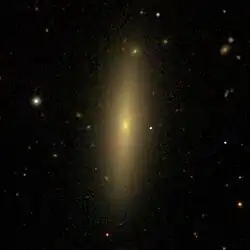| NGC 4623 | |
|---|---|
 SDSS image of NGC 4623. | |
| Observation data (J2000 epoch) | |
| Constellation | Virgo |
| Right ascension | 12h 42m 10.7s[1] |
| Declination | 07° 40′ 37″[1] |
| Redshift | 0.006027/1807 km/s[1] |
| Distance | 54,889,674 ly |
| Group or cluster | Virgo Cluster |
| Apparent magnitude (V) | 13.24[1] |
| Characteristics | |
| Type | SB0+?, E7[1] |
| Size | ~35,751.52 ly (estimated) |
| Apparent size (V) | 2.2 x 0.7[1] |
| Other designations | |
| PGC 42647, UGC 7862, VCC 1913[1] | |
NGC 4623 is an edge-on lenticular or elliptical galaxy[2][3] located about 54 million light-years away[2] in the constellation of Virgo.[4] NGC 4623 is classified as an E7, a rare type of "late" elliptical that represents the first stage of transition into a lenticular galaxy.[3] NGC 4623 was discovered by astronomer William Herschel on April 13, 1784.[5] NGC 4623 is a member of the Virgo Cluster.[6][7]
See also
- List of NGC objects (4001–5000)
- NGC 3115- another edge-on lenticular galaxy
References
- 1 2 3 4 5 6 7 "NASA/IPAC Extragalactic Database". Results for NGC 4623. Retrieved 2017-09-09.
- 1 2 "Your NED Search Results". ned.ipac.caltech.edu. Retrieved 2017-09-09.
- 1 2 "Galaxy Morphology - Ronald J. Buta". ned.ipac.caltech.edu. Retrieved 2017-09-09.
- ↑ Rojas, Sebastián García. "Galaxy NGC 4623 - Galaxy in Virgo Constellation · Deep Sky Objects Browser". DSO Browser. Archived from the original on 2017-09-10. Retrieved 2017-09-09.
- ↑ "New General Catalog Objects: NGC 4600 - 4649". cseligman.com. Retrieved 2017-09-03.
- ↑ "Detailed Object Classifications". ned.ipac.caltech.edu. Retrieved 2017-09-09.
- ↑ "The Virgo Cluster". www.atlasoftheuniverse.com. Retrieved 2017-09-09.
External links
 Media related to NGC 4623 at Wikimedia Commons
Media related to NGC 4623 at Wikimedia Commons- NGC 4623 on WikiSky: DSS2, SDSS, GALEX, IRAS, Hydrogen α, X-Ray, Astrophoto, Sky Map, Articles and images
This article is issued from Wikipedia. The text is licensed under Creative Commons - Attribution - Sharealike. Additional terms may apply for the media files.